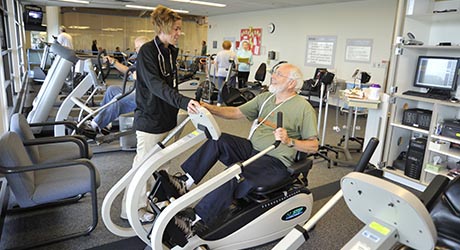Frequently Asked Questions
What is cardiovascular rehabilitation?
Cardiovascular rehabilitation is a medically monitored program consisting of 36 sessions of exercise, education and diet modification specifically tailored to your needs. Cardiovascular rehabilitation staff will help you make lifestyle changes that can lead to a stronger and healthier heart.
What are the benefits of cardiovascular rehabilitation?
This program can dramatically improve your health and the quality of your life. Cardiovascular rehabilitation helps you feel better and reduces your risk of future heart problems. Patients who participate in a cardiovascular rehabilitation program have a 50 percent lower risk of death and a 30 percent lower risk of a heart attack over four years, compared to patients who do not go through a cardiovascular rehabilitation program.
Other benefits:
- Perform more activities of daily living
- Return to work and regular activities with a better understanding of your capabilities and limitations
- Reduce your risk for future heart or vascular-related problems
- Sleep better at night
- Increase energy levels
- Decrease symptoms of shortness of breath, chest pain and swelling
- Enjoy a greater quality of life with less depression and anxiety
- Benefit from a stronger, healthier heart
Who should go through a cardiovascular rehabilitation program?
Cardiovascular rehabilitation is recommended for a variety of heart-related procedures, surgeries and diagnoses, including:
- Heart attack
- Angioplasty or coronary stents
- Coronary artery bypass surgery
- Heart valve surgery
- Heart transplant
- Stable angina (chest pain)
- Chronic heart failure
- Systolic heart failure
- Peripheral Arterial Disease (PAD)
- LVAD implant
How long is the cardiovascular rehabilitation program?
The program generally runs three times a week, for twelve weeks.
Do I have to attend every session?
Yes. To gain the most benefit from this program, it is crucial to attend all sessions. The program consists of three sessions per week for about 12 weeks.
What should I wear during cardiovascular rehabilitation?
We suggest wearing comfortable clothing and closed toe shoes.
Will my health insurance cover the cost of cardiovascular rehabilitation?
Medicare and most health insurance companies provide benefits for cardiovascular rehabilitation. Please contact your Medicare or health insurance provider for further information.
Is the cardiovascular rehabilitation staff certified?
Your treatment plan will be supported by professionals certified by the American College of Sports Medicine and our medical director.
Where is cardiovascular rehabilitation performed?
Cardiovascular rehabilitation takes place in the Morse Center, a 20,000 square foot fitness facility on the UTMC campus.

